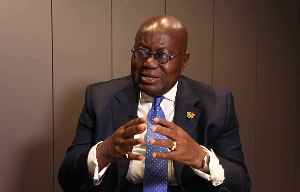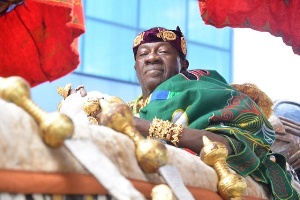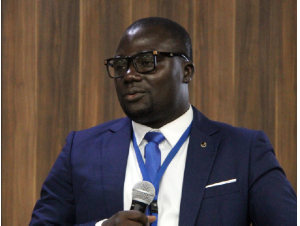Professor (Emeritus) Oti Boateng, the Chancellor of the All Nations University has underscored the importance for the country to adopt a development module that is tailored to its specific needs and recognizes the role of traditional institutions in nation-building.
Speaking at the first graduation ceremony of the University, Professor Oti Boateng said that adopting such a model will lead to significant development in the socio-economic factors which will culminate in the eradication of poverty, gender inequality and others.
Below is his full speech
We are thankful to the Almighty, the Most High, for the grant of Presidential Charter for the University to award degrees and diplomas.
The theme for this ceremony, Mentorship and Institutional Development for Quality Higher Education in Ghana, is timely and relevant, coming at a time when the University has attained a charter status and the country is redefining its development agenda, and especially within the period the entire African continent is exploring the role of innovative learning systems due to the outbreak of a pandemic which challenges our old ways of mentoring and providing quality education to our students.
Founded in 1997, the All Nation University (ANU) began as a modest knowledge-bearing institution in Koforidua by admitting and training students from the four corners of Ghana and beyond. After attaining a fully-fledged University status and becoming the first Ghanaian University and the first private University in Africa to build and launch a satellite (GhanaSat-1) deployed from the International Space Station into outer space on 17th July 2017, the University is no longer modest. It has a large vision of the role it can play in the development of Ghana and Africa. As a science and technology University, it is directed by a vision that will put science and technology in the service of the people and the development of Ghana and the African continent.
We believe that a fully-fledged ANU will enable the University fulfil its mission, diversify and meet the changing needs of the country in teaching excellence, research and research training, and keep pace with the increasingly competitive international university sector.
Our goal is to reposition the University as a strategic force for the development and dissemination of innovation, pacesetting leadership and critical thinking in Africa. We need to transform the University into a 21st century knowledge centre and global laboratory of development planning where ideas are shopped for Ghana and Africa’s development.
Above all, we need to take inspiration from the award-winning Root-based development model, which has been successfully implmented in New Juaben, to make real and significant impact on the communities in New Juaben, Ghana and Africa. A clear pathway to achieve these goals is through the collective efforts by all of us, to work relentlessly and assiduously towards their attainment.
Mr. Chairman, distinguished ladies and gentlemen, economic theory and practice teaches us that, technological progress based on home-grown development models is what drives growth and development in the long run. Growth, in turn, generates the wealth that enables us to address the fundamental challenges confronting society in general-the challenge of poverty and malnutrition, the challenge of illiteracy, the challenge of unemployment and underemployment, the challenge of infant mortality, and a host of other challenges. Home-grown development models is likely to lead to innovation in finding solutions to contemporary challenges confronting us. History teaches us that without such an approach, we will make little progress in our development initiative. It has now become clearer that there cannot be any meaningful development without the active participation of the citizenry, particularly as governments alone cannot meet all the competing societal demands on a timely basis.
The current global consensus on development favours a Home-Grown Strategy rather than economic blueprints from the World Market. There is therefore the need to harness the potential role of the traditional governance system in the socio-economic, environmental and geo-political development of our dear nation for sustainable community development.
The Root-based model has been creatively designed for the Traditional States to play a complementary role to Government and the private sector in sustainable community development in Africa. With a well-implemented community development model replicated throughout the Traditional Areas in Ghana and the communities therein, poverty, insecurity and inequalities in the country would be substantially reduced. This would then form the basis upon which Ghana can make a significant stride towards the attainment of the UN Sustainable Development goals.
As Chancellor, I intend to propose to the University Administration the establishment of a Center for Indigenous Development (CID) which will directly impact on the communities and beyond. The Development in Unity Trilogy and the book on “Implementing the Root-based Development’, scheduled for publication in December 2020, will form the foundational resource base for the Center which will serve as the base for exporting Ghana’s flagship Development Planning model to the rest of the continent.
With this few remarks, it is my pleasure to add my voice to that of the President and his able council members to welcome you to this historic occasion.
I am hopeful and optimistic about the future of this institution.
Once again let me extend my heartfelt thanks to all of you, especially, our guest speaker, Prof. Adarkwa for making time to grace this occasion.
Thank you.
.
General News of Sunday, 22 November 2020
Source: Dickson Boadi, Contributor
Traditional governance systems have a role to play in national development – Professor Oti Boateng
Sports

It’s not the goal of the Ghana FA to continue failing at the national team level - Henry Asante Twum
Business














